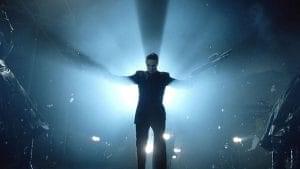
Dystopian movies have existed for nearly a century, dating as far back as the 1920s. There are plenty of famous ones that you have likely heard of; 1984, Brave New World, and Fahrenheit 451 for instance. There are also plenty of, shall we say, lesser known ones; The Cybernetic Grandma, Z.P.G. (Zero Population Growth), Gattaca.
There are even plenty of mainstream action titles that can fall into the dystopia category; V for Vendetta, the Hunger Games, and Robocop. It’s like a jackpot casino, cause you can roll the wheel of genres and someone has probably made a version set in a dystopia.
There is one dystopia film title that I believe is very underrated and deserves far more attention than what it’s gotten. The 2002 American film Equilibrium, directed by Kurt Wimmer is a beloved and sometimes forgotten dystopian movie.

What is Equilibrium About?
If you’re already familiar with this film, you might be rolling your eyes at this point. Don’t worry, I’ll explain myself.
For those who aren’t familiar, Equilibrium is a dystopian film set in the city of Libria, a totalitarian city founded by the survivors of World War Three. In Libria, the cause of the war is outlawed; emotion.
The citizens are required by law to self-administer drugs to suppress their emotions, and all objects which are paraphernalia that can trigger emotions is illegal. John Preston, played by Christian Bale, is a kick-a*s master of Gun-Kata (Kung Fu, but with guns), and enforces the law until a sudden happenstance prevents him from taking the drug one day.
On a technical level, the movie varies from amazing to cheesy. The set design, lighting, and cinematography are great, Christian Bale is awesome, and the choreography is entertaining and incredibly well done. The special effects and CGI are very obviously dated, though, but since this movie hardly relies on them it really doesn’t take anything away from the experience. The movie knows when to go quiet and subtle, and when to get bombastic and over-the-top.
As the perceptive reader that I’m sure you are, you might have noticed a stark contrast of themes in the paragraphs above. Is Equilibrium a serious dystopia about the deeper nature of humanity, or is it a goofy action flick with lots of guns and violence? This is actually one of the major criticisms that this film receives. Is it trying to be 1984 or The Matrix?
Now, as a professional connoisseur of films that I have personally seen from the comfy place that is my living-room, I believe that I am more than qualified to over-examine movies and give an accurate and academic response. Why can’t it be both?

Is it Really Better than Other Dystopian Flicks?
You see, 1984 is actually my favorite dystopian book. It’s ingenious and horrific and shows just how far humanity can oppress each other. It is a point of no return, with terrifying implications and important themes that are still relevant today. However, I don’t think this translates well as a movie.
Sure, the book is an iconic masterpiece, but, in my opinion, it just doesn’t work as well as a movie.
In comparison, V for Vendetta is actually a great movie, and, in my opinion, is better as a movie than the comic book from which it drew influence.
The movie has fun action, it’s clever, witty, and entertaining. What this movie suffers from is… snobbishness. What I mean, is that V for Vendetta can feel a bit pretentious. It goes for an artsy moral-metaphor that undercuts the story it’s trying to tell.
Without spoiling, if you’ve seen the movie, remember when Natalie Portman kisses V? Don’t tell me that wasn’t weird, considering the context.
V for Vendetta tries to go for a dubious moral gray area, but come on. It’s a great film, but the villain is basically British Hitler. It’s not very gray.
Equilibrium, on the other hand, has no qualms about who’s good or bad.
The “Sense Offenders” are good, the totalitarians are bad. Humans can’t live like robots.
Equilibrium works as a kick-a*s movie that slams the worldview that removing humanity is the best way to save humanity. The strife, the struggle, pain, and loss, are necessary parts of living. Otherwise, we’re simply… existing.
This is a dystopia movie that really succeeds as a movie and presents a clear and succinct message without ruining the story it’s trying to tell by interrupting it with a philosophical lecture.
Movies allow us to see the dystopic horrors before our own eyes, we don’t need a character to turn to camera and explain why British Hitler is evil.
I’m not slamming the other movies I’ve mentioned here (I enjoy all of them), I’m merely arguing why I believe that Equilibrium is underrated.



[…] stories that grapple with the loss of individuality in the face of conformity. Films such as “Equilibrium” (2002) thrust characters into worlds where emotions, memories, and unique identities are […]
All of those are happening now for real in 2020. I never thought could actually become real. It’s horrifying.
My friend showed me this movie in 2006 and it became one of my favorite movies ever since, seen it dozens of times. While watching it I was blown away I asked him “wtf, why don’t more people know about this movie?” He said “because it came out in between The Matrix movies” and it all clicked. Though it came out dec2002 and the two Matrix sequels came out in 2003, he did have a point. The two sequels were announced sometime in 2002 and from that point on all anyone could think about was The Matrix (incredible franchise, not knocking it at all, still watch it regularly). So people spent 2003 getting hype for the sequels, rewatching the first Matrix, playing Enter the Matrix, and basically ODing on the red pill. No one had time for Equilibrium.
In short, Equilibrium is seriously underrated.